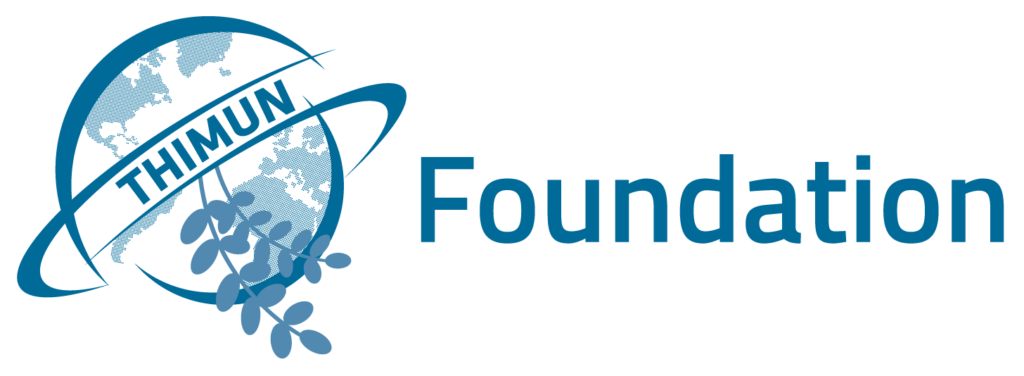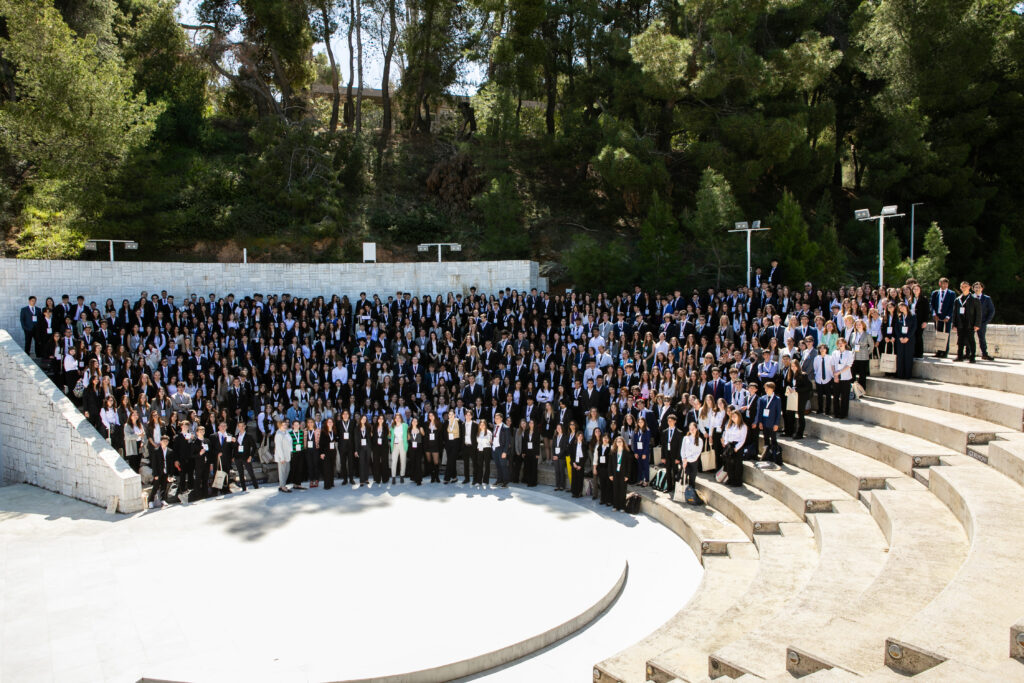Download & Print the Rules of Procedure
General Information
Official Language
English is the only official and working language of this conference and therefore it is to be used in all proceedings and all kinds of communication between the delegates. This rule applies to all the committees and the school premises at all times.
Delegations and Delegates
During formal procedures, delegations can only communicate with each other by the means of note-passing. Notes should always have professional and diplomatic content and are not allowed during the voting procedure.
All participants should always wear their accreditation; the Security Staff has been instructed to not allow anyone enter a committee room without their badge. If the badge is lost, it can be replaced for the appropriate fee.
Delegates need placards to vote in their committees. It is essential that delegates do not lose them. However, if a delegate loses their placard, they should immediately request a new one from the Admin Staff in their committee room.
Each participant is responsible for their personal belongings for the duration of the conference.
Every delegate/advisor will be provided with three lunch tickets without which they will not be able to get lunch.
Dress Code
Formal attire is required as expected from diplomats and international staff, meaning that male delegates are requested to wear a suit or jacket combined with dress pants and a dress shirt, tie, dress shoes and socks.
Female delegates should wear a suit, dress slacks or a skirt, together with a blouse, or a dress with dress shoes and stockings. The ACGMUN Staff will warn delegates who are inappropriately dressed only once. Should the delegates not comply with the rules of conduct, they will be asked to leave and will only be allowed to return to their committee once they have changed into clothes that abide by the dress code.
Student Officers
The Student Officers include all Chairs of all committees as well as the President of the GA, the Secretary General and their deputies. The Chairs will be responsible for the operation of their own committee, while the Secretariat will be responsible for the operation of the GA and the conference as a whole.
The people interested in applying as a Student Officer or a Secretariat member have to fill in the appropriate forms in the ACGMUN website along with a Letter of Recommendation from their respective advisor and a Letter of Motivation for their choices. The applicants will then be tested during the Student Officer and Secretariat Interviews. Applicants that are selected for the position of a Student Officer will be uploaded in the website as soon as the selection process is complete. The selected members will also be trained in multiple workshops prior to the Conference in regard to Chairing rules and Study Guide drafting.
The Secretariat reserves the right to ban any participant failing to adhere to the rules of conduct of the Conference.
Other
All mobile phones and electronic devices must be switched off. Laptops are allowed only during lobbying.
No smoking or alcohol consumption is allowed on the premises.
Delegations
Delegations
Each delegation is composed of as many delegates as the number of forums the delegation holds a seat on. Each delegation has only one representative in each forum. There are 3 kinds of delegations:
- Member delegations: the sovereign states that officially hold United Nations membership.
- Observer delegations: these territories have been granted an observatory status at the United States, meaning that they can be involved in the discussions of the issues, have a right to vote but not the ability to Main Submit.
- NGOs (Non-Governmental Organizations): These organizations are allowed to participate in the discussions and vote. This category also includes UN bodies and agencies such as UNESCO and UNIDO.
Ambassadors
Every delegation should appoint an ambassador who will act as its official representative. That means that it is the job of the ambassador to guide and aid the delegates in regard to the procedures, policies and general behavior. The ambassador represents the interests and policies of their respective country. If a situation arises in which the country is involved, the ambassador may be summoned to the Security Council or the International Court of Justice. During the start of each committee issue, the Student Officers of the GA committees may ask Ambassadors to deliver their policy statements.
Rules of Procedure and Conduct
Lobbying
The Lobbying procedure is the procedure during which the delegations in a Forum form alliances in order to successfully create a resolution. Each resolution has a Main Submitter and as many Co-Submitters as the countries which comprise the alliance. There will be separate time for lobbying on each issue and the time will be allocated appropriately by the Student Officers of the committee.
Debate
Modes of Debate:
- Closed debate: This form of debate is only used when debating on Amendments. Under this format, there is a distinction between time in favor and time against the amendment debated upon.
- Open debate: This form of debate is only used when debating Resolutions. Under this format, the above distinction does not exist and therefore delegates are given the floor in an order without regard to their support or opposition to the proposal.
Scope
The rules of procedure shall apply to the General Assembly and all the forums of the General Assembly, the Environmental Commission (EC), the Economic and Social Council (ECOSOC), the World Health Organization (WHO), the Security Council (SC), the Historical Security Council (HSC), the Special Conference (SPECON), the International Labor Organization (ILO) and the International Court of Justice (ICJ). Modifications for forums that operate under different rules will be presented in this document.
Committee Session
Rule 1: No delegate has the right to question the authority of the United Nations. The decisions of the Secretariat and the Chairs are final.
Rule 2: All participants are expected to behave in an appropriate manner and respect other delegates, chairs and staff; participants who fail to comply with the aforementioned will be expelled from their committee and/or the conference.
Rule 3: If a delegate finds that it is impossible for them to attend their Committees for any reason, they must inform their Chairs and their Advisor.
Rule 4: Roll Call Quorum – Verification of Quorum
The Chair or President shall conduct attendance by Roll Call at the beginning of every committee session. A quorum constitutes the 2/3 majority of the membership of each forum. Proceedings may not commence before a quorum has been established.
Rule 5: It is vital that every delegate wishing to address the committee or make a motion obtains the floor beforehand. Once the floor is open, the delegate must be recognized to do the aforementioned.
Rule 6: The Chairs of each Committee is to set a debate time for the subjects. If necessary, debate time may be extended.
Rule 7: No motion or point can interrupt the speaker, except for the point of personal privilege when it refers to audibility problems. The voting procedure can be interrupted only by a point of order.
Rule 8: During debate, a delegate who has the floor may yield the floor either to the chair or to another delegation. Consecutive yields are not permitted. However, the delegate that had the floor yielded to him/her also has the right, with the approval of the chair, to be asked and respond to POIs.
Rule 9: All forums shall commence under the open debate format, while the closed debate format is to be used when debating an amendment or if deemed necessary by the Chairs.
Rule 10: Right of Reply
A delegate whose personal or national integrity has been impugned by another delegate’s comments may request a Right of Reply from the Student Officers. Disagreement with the content of a delegate’s speech is not on grounds for a Right of Reply.
Resolutions
Rule 11: All resolutions shall be checked and approved by the authorized Approval Panel. The Chairs of the General Assembly Committees will decide which resolutions will be discussed in the General Assembly.
Rule 12: No resolution can contain financial amounts but it can refer to possible financial resources without specifications of exact amounts.
Rule 13: Signatories:
Each resolution must have a Main Submitter and Co-Submitters. Signatories are recognized as those delegates who wish to see the Resolution debated and should constitute 1/3 of the total members present in the committee. Signatories are not required to support the Draft Resolution during the voting procedure; they only agree to put their names as those who are interested in seeing the Working Paper nominated as a Draft Resolution for further debate. Signatories can sign only one resolution per topic. However, there is no restriction in the voting procedure.
Amendments:
Rule 14: All amendments shall be submitted on the official amendment sheet during the Committee sessions.
Rule 15: The Chair decides when the proposals that refer to amendments shall be discussed. The amendment is entertained after the floor has been yielded by the Chair to the submitter. Once the floor is open and the chair asks for a speaker, the delegate should raise the placard in order to be recognized. Once they are recognized, the delegate should ask the chair whether their amendment is in order. If the Chair responds in the affirmative, the amendment is officially entertained and the House moves to Closed Debate.
Rule 16: When a delegate moves the amendment, the Chair reads it out slowly and clearly for all delegates to note down.
Rule 17: Only one amendment per amendment sheet will be in order.
Rule 18: Delegations can vote for, against or abstain an Amendment.
Voting
Rule 19: During all voting procedures in the Committees, guests are requested to leave the room, members of the Admin Staff must take their place for the voting procedure and members of the Security Staff must seal the doors.
Rule 20: Each country represented shall only have one vote per voting procedure; NGOs and Observer States are not allowed to vote.
Rule 21: During the voting procedure, delegates raise their placards to vote in favor of, against or abstain from the vote. However, when the Motion to Divide the House is entertained, abstentions are not allowed.
Rule 22: Abstentions will be allowed on both resolutions and amendments. On procedural matters (motions and points) abstentions are not allowed.
Rule 23: If the Committee votes come to a tie then the proposal is rejected.
Rule 24: A resolution passes if the number of votes in favor exceeds the number against, regardless of the number of abstentions; i.e. abstentions do not count either for or against the adoption of a resolution.
Rule 25: Clapping is only allowed when a resolution passes.
Rule 26: Veto Power
The Permanent Members of the Security Council have the right to issue a veto (to be used when a measure proposed is against the country’s international policy or threatening its national sovereignty). If the delegation of a P5 country disagrees with a specific idea or clause but does not wish to issue a veto, then a vote to abstain is taken. After a veto has been issued, the Permanent Member of the Security Council may move to a P5 Caucus, a closed discussion that takes place immediately after a veto has been issued, while other members continue to debate; once a decision has been reached in the P5 Caucus, it will be taken to the Security Council.
Points and Motions
|
Name |
Description |
Debatable |
Vote |
Second Required |
May Interrupt the Speaker |
|
Point of Personal Privilege |
Register a complaint |
No |
– |
No |
Yes |
|
Point of Order |
Enforce the rules of procedure |
No |
– |
No |
Νο |
|
Point of Parliamentary Inquiry |
Clarify a rule |
No |
– |
No |
No |
|
Motion to Divide the House |
Demand a rising vote |
No |
2/3 |
No |
No |
|
Motion to Divide the Question |
Divide resolution to clauses (SC) |
No |
2/3 |
Yes |
No |
|
Motion to Reconsider |
Retake vote |
Yes |
2/3 |
Yes |
No |
|
Motion to Extend Debate Time |
Define speaking time |
Yes |
2/3 |
Yes |
No |
|
Motion to Move the Previous Question |
Moving to voting procedures |
No |
2/3 |
Yes |
No |




